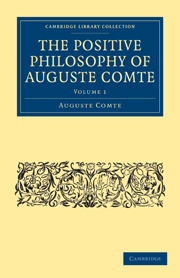CHAPTER II - ANATOMICAL PHILOSOPHY
Published online by Cambridge University Press: 29 August 2010
Summary
Development of Statical biology
It was during the second half of the last century that Daubenton and Vicq-d'Azyr achieved the extension of the statical study of living bodies to the whole of known organisms; and the lectures and writings of Cuvier carried on, and spread abroad, the regenerating influence of this great view. But, indispensable as was this conception to the development of anatomical science, it could not complete the character of statical biology without the aid and addition of Bichat's grand idea of the general decomposition of the organism into its various elementary tissues; the high philosophical importance of which appears to me not yet to be worthily appreciated.
The natural development of comparative anatomy would, no doubt, have disclosed this analysis to us sooner or later: but how slow the process would have been we may judge by what we see of the reluctance of comparative anatomists to abandon the exclusive study of systems of organs while unable to deny the preponderant importance of the study of the tissues. Of all changes, those which relate to method are the most difficult of accomplishment; and perhaps there is no example of their resulting spontaneously from a regular advance under the old methods, without a direct impulsion from a new original conception, energetic enough to work a revolution in the system of study. Biology must, from its great complexity, be more dependent on such a necessity than any other science.
- Type
- Chapter
- Information
- The Positive Philosophy of Auguste Comte , pp. 399 - 409Publisher: Cambridge University PressPrint publication year: 2009First published in: 1853
- 1
- Cited by



